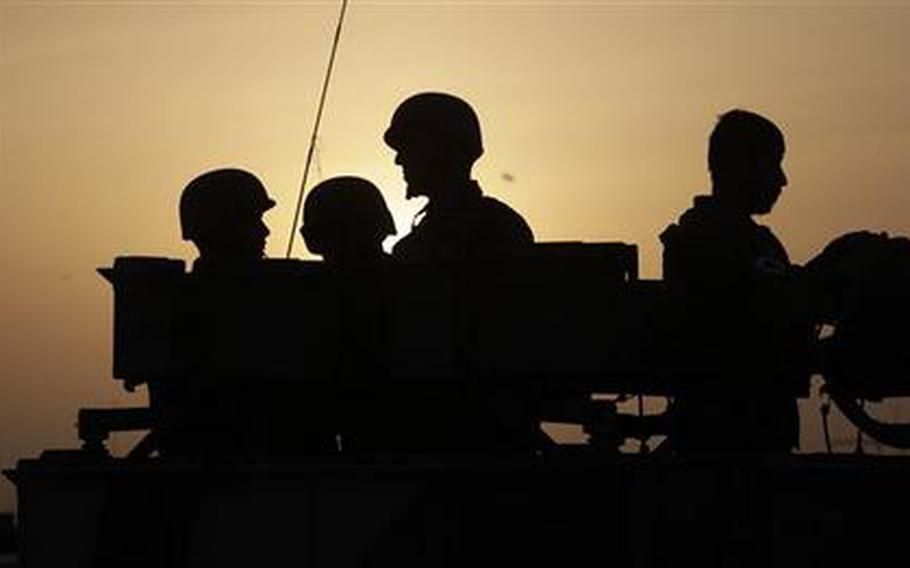Middle East
Defiant message further dims Afghan peace hopes
Stars and Stripes August 6, 2013

Afghan Army soldiers, pictured at Forward Operating Base Howz-e-Madad, operated jointly by the Afghan Army's 1st Battalion of the 3rd Brigade and the U.S. Army 2- 502 Infantry, 101st Airborne Division, in Zhari district, Kandahar province, southern Afghanistan, Saturday, Aug. 21, 2010. The 101st Airborne's 2-502 and their Afghan Army partners operate in a district which, as the birthplace of the Taliban movement, continues to hold many well-armed fighters, and a support network which provides the fighters with improvised explosives and safe havens. (AP Photo/Brennan Linsley)
KABUL — A defiant message purported to be from the reclusive leader of the Taliban cast even more doubt Tuesday on faltering peace efforts in Afghanistan, as Afghan leaders talked of closing the insurgent group’s political office in the Gulf nation of Qatar.
The Taliban message, released Tuesday and said to be from Mullah Mohammed Omar, endorses engaging in peace talks but only in the context of all international troops withdrawing from Afghanistan, an outcome that is unlikely any time soon. Taliban spokesman Zabiullah Mujahid said the statement was from Mullah Omar.
“The aim of our contacts and talks with the invaders which are conducted through the Political Office is to put an end to occupation of Afghanistan,” the statement reads. “No one should perceive that the [Taliban] will relinquish of their lofty religious principles and national interests.”
The Taliban, who came to power in 1996 in the aftermath of the bloody Afghan civil war, were swept from power by the U.S. invasion of Afghanistan in 2001 but have been fighting a guerrilla war against international troops and their Afghan allies ever since. Tuesday’s statement was timed for the Muslim holiday Eid al-Fitr, which begins Thursday in most Islamic countries.
Meanwhile, the Afghan government is looking into alternative locations for peace talks, still livid over an opening ceremony for the Taliban’s office in Doha, Qatar, that included insurgent representatives raising the old flag of the Islamic Emirate of Afghanistan, as the Taliban called the country when they ruled, said Mohammed Ismail Qasimyar, a senior member of Afghanistan’s High Peace Council.
Qasimyar also criticized the Doha office for providing a venue for the Taliban to raise funds, even as they carried out suicide bombings in Afghanistan.
“Countries like Saudi Arabia, the [United Arab] Emirates, Turkey, Turkmenistan, have already said they are ready to host such talks,” he said. “There are other possibilities, but the High Peace Council preference would be to hold them inside [Afghanistan].”
The Qatar office was once seen as a key to peace negotiations between Kabul and Taliban representatives, but since its opening in June, Afghan President Hamid Karzai has refused to let his peace emissaries travel to Qatar, and Taliban officials have stepped up their anti-Kabul rhetoric. Since the opening of the office, the Taliban have acted more like a government-in-waiting than an insurgent group, enraging Karzai.
A spokesman at the U.S. Embassy in Kabul declined comment on the fate of the Doha office or the Taliban statement. The U.S. has backed the peace talks, but emphasized that they must be Afghan-led.
While Qatar has ultimate say over the fate of the Taliban office, the office was only opened with Kabul’s blessing and keeping it open under the objections of the elected government of Afghanistan would be unlikely. According to several news reports, the Taliban temporarily closed the office in July after they were made to remove a flag and a plaque bearing the name of the Islamic Emirate of Afghanistan, though it’s unclear whether it has reopened.
Mujahid, the Taliban spokesman, deferred comment on any changes to the Doha office to representatives in Qatar. Those representatives, who have rarely spoken to the media since the opening of the office, did not answer their phones Tuesday.
In the Taliban message released Tuesday, Mullah Omar pledged not to participate in the 2014 Afghan presidential elections, which he called a “deceiving drama” and claimed have already been rigged by the U.S. While falling short of threatening violence against voters, he urged Afghans not to take part in the elections, in which Karzai and other Afghan officials have encouraged the Taliban to participate.
“Participation in such elections is only a waste of time, nothing more,” the Taliban statement read.
The elections are seen as key for stability in Afghanistan as international troops leave and Karzai, the only president to rule post-war Afghanistan, is constitutionally mandated to leave office.
Adding another inflammatory note, Mullah Omar also encouraged more so-called “green on blue” attacks, wherein Afghan troops turn their weapons on their international counterparts, saying any such attacker will be welcomed as a hero by the Taliban. Those attacks, which spiked in 2012 before ebbing this year, have eroded trust between Afghan troops and foreign forces at a key moment in the war when the NATO-led international military coalition is shifting from a combat to a training role.
The aggressive tone of the statement does not denote a willingness for peace, said Qasimyar, the High Peace Council member. Before peace talks can start, he said, the Taliban must jettison any hopes of taking the country back by force, and reconcile themselves to participation in political processes, such as elections.
“They are still thinking that they will be rulers again, and through the use of force and military operations they will conquer the country back and rule over the entire nation,” he said. “To us, it’s not possible because the 1990s conditions don’t exist today.”
Zubair Babakarkhail contributed to this report.